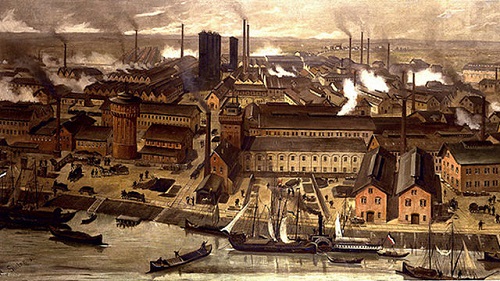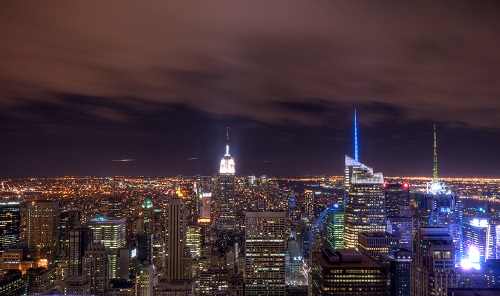Difference between Industrialization and Urbanization
As we all know, the world has developed a lot since the ages of industrialization in the 20th century. Industrialization seasons were marked by a change in the social and economic phenomena. The transformation involved a paradigm shift from an agricultural society to an industrial society. While industrialization and modernization are an entity that seems intertwined, this article will look into the major differences that distinguish the two terminologies.
Definition of Terms
The term urbanization can be defined in different ways to broaden the meaning thereof. It could refer to the increase in the number of people who dwell in urban areas. It can as well be defined as the process by which major towns and trading centers are formed to become larger, due to people moving into these towns for work and living (1). Urbanization is predominantly a cause of the physical growth of a town or any urban area. Aspects that contribute to urbanization are mainly: industrialization, modernization, and rationalization that results from sociological processes. It is a historical transformation on a global scale. It majorly involves the replacement of old cultural ways to a dominating urban culture.
Industrialization, on the other hand, is a change in the social and economic activities of a people, which involves a shift to manufacturing, innovation and the replacement of farming and other minor economic activities (2). The process of industrialization begun in the 1760s in Britain. During this period, there was marked growth in the population and the income that people gained. Industrialization has featured a lot in the social and economic aspects to people. One of the major phenomena that transpired due to industrialization was urbanization.
Key Differences between Urbanization and Industrialization
Industrialization and urbanization relate to each other. Industrialization is the pivot that leveled urbanization. Though the two terms do not refer to one thing, the process of separating the two terms is complex.
Process
The process of industrialization is different from the process of urbanization. Both of them are inspired by different things. Industrialization is the result of an expansion in the manufacturing process of a company. Industrialization was a shift in the manufacturing process that was influenced by a transformation in the technology and innovation spheres (3). The discovery of new and efficient ways of effecting the production of manufactured commodities led to industrialization. Inventions paved the way for manufacturers and soon, the small cottages and yarn spinning factories were changed into mega facilities that combined human labor and mechanized functions. The transformation is what we refer to as industrialization.
On the other hand, the better-mechanized manufacturing plants realized there was a need to increase their labor force. The sharp rise in manufacturing could not be sustained by the few workers who used to run the old manufacturing cottages. More people were needed to work in the manufacturing industries. The industries promised a better pay for the workers (3). People living in peasant farms in the rural areas migrated to the towns where the manufacturing industries were situated. These people realized that there were new needs that they had to meet. The food was not readily available from the farm and there was no place to call home. This evidenced the mushrooming of lodges, taverns, brothels, and hotels. People adopted new lifestyles and trade was enhanced, thus leading to urbanization.
Importance
The importance of these two phenomena also shaped the reason for their existence. The purpose that industrialization served was different from the purpose that urbanization served. Industrialization at the time was the faith of a country. Industrialization was a show of superiority and grandeur. The more a country was industrialized the richer it grew. Industrialization was an emblem that fanned the flame of a nation (3). Hence, the industrialized nations forged for more aggressive inventions that would further enhance their industrialization.
The labor force that was increasing every day due to the robust process of industrialization was already thriving in their new town. The need for everything went high. More people were working in the industries, meaning that there was more money in circulation. People were also getting salary advancements and appraisals from their companies. These dynamics funneled modernization even the more. Towns grew more as the need to accommodate the rising demands and lifestyle changes. It became apparent that urbanization was no longer an extra provision but a necessity. While the government relied upon industrialization for prestige and economic growth, people depended on urbanization for their sustenance.
The Inventions of the Two Phenomena
There is a sharp difference in the inventions that served the two spheres.
The industrial revolution was one of the most successful periods of inventions in the late 16th century and early 19th century. The era was paving way for lesser philosophical intrigues and more scientific discoveries. Carriages came into being. Coal was then discovered to be an energy source. This led to the discovery of engines. Engines and machinery that relied on fuel to run. The discovery of machinery increased the efficiency of production in the industries. Railroads were constructed to ease the work of transportation.
The process of urbanization had its own inventions as well. People invented new ways to build better houses. Construction became sophisticated. Architectural and civil engineers found out better ways to make long lasting roads. Better means of transporting people were being discovered. Carriages continued to be refined for use by people. Walking became less stylish than using a carriage. City guards evolved to become administrative authorities who started to concern themselves over city planning and public health (4). Health centers came into the picture and the nursing profession was born.
As the invention in industrialization led to better ways of manufacturing and transporting, urbanization led to inventions that aimed at a much more cozy life for the developing working class.
Advantages
It is almost hilarious that the advantages for both industrialization and urbanization were different (5).
The industrialization advantages were more direct and defined.
- Industrialization led to the creation of jobs for the poor village peasants
- The process of production was short, reliable and very effective.
- The manufactured products sold at a cheaper price.
- More industries were developed
- The GDP of the industrialized nations grew.
On the other hand, urbanization had its advantages as well.
- People had dependable jobs and increased earnings
- Health care was more efficient and reliable
- The lifestyle of the people improved
- Modernization led to the creation of jobs as well
- Quality education was provided to sustain the needs of the industries
- More cities developed
Lifestyle Differences
Both industrialization and urbanization affected the people differently. As much as the social lifestyle improved, there was a major difference that the two phenomena caused. Due to industrialization, the lifestyle that people lived was harsh. There were long hours to work in a day, the pay was meager and the working conditions were deplorable. For urbanization, the lifestyle of the people changed too. Selfish tendencies such as corruption emerged (6). People disregarded the need for family and society as well.
Monetary Perspectives
Though this correlation and differences are quite vague, there is a significant difference that shows how the availability of money influences both industrialization and urbanization.
When regarding industrialization, it is of significant importance to note that industrialization results from the want to realize more profits (7). Industrialization gained ground and prominence since a lot of income was expected as the end result. At the same time, urbanization is inspired by wants more than necessity. Financial power affects the tastes that an individual has in life (5). People with more financial power will always look for more expensive and classy lifestyle that drive urbanization. They will want fine restaurants, better houses, and better health care.
Conclusion
The major differences noted from the two phenomena portray that industrialization led to urbanization. Unless there was industrialization, chances are that urbanization would have taken longer to be felt. The industrial evolution which begun in Britain played a major role in shaping the perspective of these two terms as a major reference is given to the period of the revolution. Much emphasis, however, is put on the fact that both phenomena are closely linked. While urbanization would have been slow or impossible without industrialization. However, unless better living standards would have been identified and felt through urbanization, chances are that the negative practices such as inhumane treatment would have continued to clog the manufacturing sector up to date. It is the process of urbanization that exposed people to the reality that the lives of the people could be improved in the industrialization process.
Summary of the Difference between Industrialization and Urbanization
| Factor | Industrialization | Urbanization |
| Definition | The process where people shift their economic activities to industrial manufacturing | The process of shifting from rural settings to urban towns and cities |
| Process | Industrialization evolves from the need to expand manufacturing operations | Urbanization results when people move to manufacturing cities and towns in search of better opportunities |
| Importance | The importance of industrialization is that it contributes to the growth of a country. | Urbanization is important as it helps in meeting the growing needs of the people. |
| Lifestyle | Industrialization affected the lives of the people negatively due to inhumane treatment | Urbanization helped to better the lives of people by creating efficient healthcare, better housing, and planned cities. |
- Difference between Traditional Commerce and Ecommerce - February 16, 2018
- The Differences between Copay and Deductible - February 6, 2018
- Differences between Personal Property and Real Property - January 29, 2018
Search DifferenceBetween.net :
Leave a Response
References :
[0]Tisdale, H. (1942). The Process of Urbanization. Social Forces, 20(3), 311. http://dx.doi.org/10.2307/3005615
[1]Treiman, D. (1970). Industrialization and Social Stratification. Sociological Inquiry, 40(2), 207-234. http://dx.doi.org/10.1111/j.1475-682x.1970.tb01009.x
[2]Pred, A. (1965). Industrialization, Initial Advantage, and American Metropolitan Growth. Geographical Review, 55(2), 158. http://dx.doi.org/10.2307/212709
[3]Vlahov, D., & Galea, S. (2003). Urban health: a new discipline. The Lancet, 362(9390), 1091-1092. http://dx.doi.org/10.1016/s0140-6736(03)14499-6
[4]Shafik, N. (1994). Economic Development and Environmental Quality: An Econometric Analysis. Oxford Economic Papers, 46(Supplement_1), 757-773. http://dx.doi.org/10.1093/oep/46.supplement_1.757
[5]Adams, R. (1964). : World Revolution and Family Patterns. William J. Goode. American Anthropologist, 66(3), 664-666. http://dx.doi.org/10.1525/aa.1964.66.3.02a00270
[6]Gollin, D., Jedwab, R., & Vollrath, D. (2015). Urbanization with and without industrialization. Journal Of Economic Growth, 21(1), 35-70. http://dx.doi.org/10.1007/s10887-015-9121-4
[7]https://en.wikipedia.org/wiki/Second_Industrial_Revolution
[8]http://philschatz.com/sociology-book/contents/m42936.html


